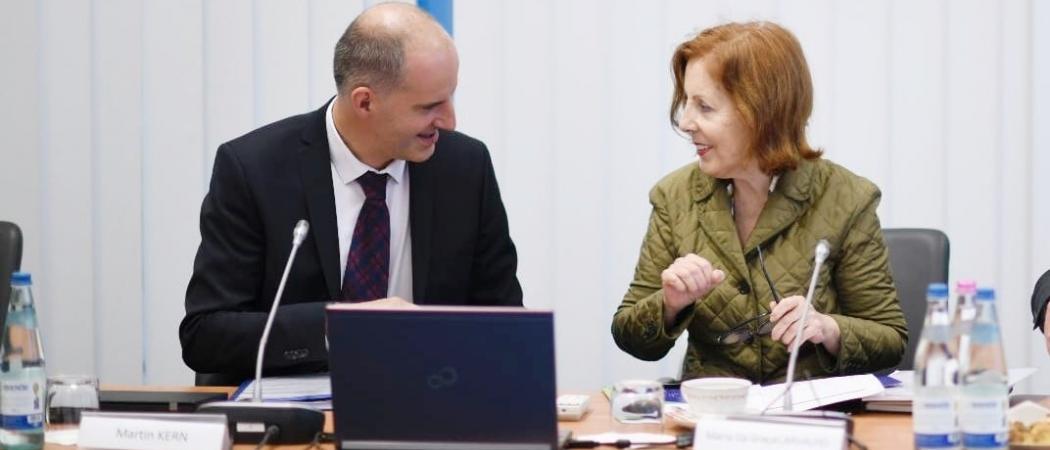Parliament is working on new amendments to legal framework of the European Institute of Innovation and Technology which are to be voted in the industry committee by the end June

EIT director Martin Kern and Portuguese MEP Maria da Graça Carvalho. Photo: EIT.
New amendments by MEPs Maria da Graça Carvalho and Marisa Matias are to give a nimbler legal framework for the European Institute of Innovation and Technology (EIT) to respond to the coronavirus crisis.
The MEPs say the amendments call on EIT’s eight public-private partnerships, the Knowledge and Innovation Communities (KICs) to come up with new business strategies which should stay in place for two years to help mitigate the effects of the pandemic and increase the resilience of the ecosystem.
The updated law would also give KICs more flexibility on how they spend their budget and will loosen administrative rules. “We are making our legislation very unbureaucratic,” Carvalho told Science|Business.
In the new strategies the KICs should draw up dedicated calls that support business restructuring and adapt to the new, remote working conditions. The EIT governing board will evaluate whether KICs need to carry on under the new strategies after the initial two-year period ends.
The MEPs say KICs should also fast track evaluations of small and medium companies applying for funding, to ease up their access to cash throughout the crisis.
In addition, the EIT should cut red tape and allow the KICs to unlock payments for researchers and entrepreneurs who are often self-employed and the first to be hit by the slowdown in activity. “Money should arrive fast to those in need,” Carvalho said.
New rules
Carvalho and Matias submitted reports with the new EIT legislation to the parliament’s industry committee ITRE at the end of February, but they were not published until March, after they had been translated to all EU official languages. By then, the COVID-19 crisis had already pushed the continent into lockdown and the proposed legislation was no longer appropriate. Carvalho said she had to “adapt to the new situation” and revise the reports to “transform the EIT in one important tool to fight the crisis.”
The new amendments would get rid of previous provisions that, according to Carvalho, had “introduced some rigidities.”
One amendment introduced in February imposed a five per cent spending limit on administrative costs. The new version does not include the limit. “It now says administrative costs should be kept to a minimum, but it does not give a figure,” Carvalho said.
Previous financial ring fencing around certain activities have all been erased, with the exception of a provision that mandates the KICs set aside 15 per cent of their budgets for the EIT’s new regional innovation scheme, a plan by MEPs to expand the geographical coverage of the KICs within a country. Another soft limit has been kept to guide the EIT’s spending on the launch of new KICs, the MEPs saying 10 per cent of the budget should be devoted to the creation of new KICs.
Call for caution
In a meeting of ITRE last week, some MEPs suggested the EIT should focus its resources on the crisis even more and cancel plans for two new KICs, one of which is due to be launched in 2022 and another one in 2025. “It is essential to review any initiatives on creating new KICs due to the budgetary constraints related to COVID-19 crisis,” said Dutch conservative MEP Robert Roos. Ivars Ijabs, a liberal Latvian MEP in the Renew group, also favoured postponing the launch of the EIT’s tenth KIC in 2025.
Carvalho agrees that “times are uncertain” but said the new amendments, instead of halting preparations for the new KICs, offer enough flexibility to change the launch schedule. “We should not erase the possibility to have new KICs but we should be flexible,” she said.
Carvalho and Matias are working on building compromise inside the parliament and hope the amendments will pass through ITRE in June. MEPs might be able to vote on the new EIT law in a plenary this autumn, but the timing depends on how the coronavirus crisis evolves and on wider negotiations on the EU’s multiannual budget.
Change is inevitable
In a press conference last week, Martin Kern, EIT’s interim director, said it is unlikely that innovation ecosystems will bounce back to how they were in December 2019. Investment pipelines have dried up, supply chains have been hit, clients are no longer placing orders, innovation is on hold, and universities are closed. “That is very difficult ground to be in,” Kern said.
Pending the new legislation being approved by the parliament, the EIT has already asked KICs to review their business plans and evaluate their exposure to the looming economic crisis. When the results came in, the EIT realised at least 30 per cent of its projects “will have quite substantial changes,” said Kern.
KICs are already working on reorienting their projects instead of stopping them. What EIT can do is give flexibility to reorient that funding towards “new projects that now can make a difference,” Kern said. One case in point, the urban mobility KIC is redirecting some of its funding towards projects seeking to rebuild confidence in public transport after months of lockdown.
“What we need from our innovators now is that they quickly bring the solutions to solve the crisis and turn their priorities around and focus on what is needed now by European citizens,” Kern said.





 A unique international forum for public research organisations and companies to connect their external engagement with strategic interests around their R&D system.
A unique international forum for public research organisations and companies to connect their external engagement with strategic interests around their R&D system.